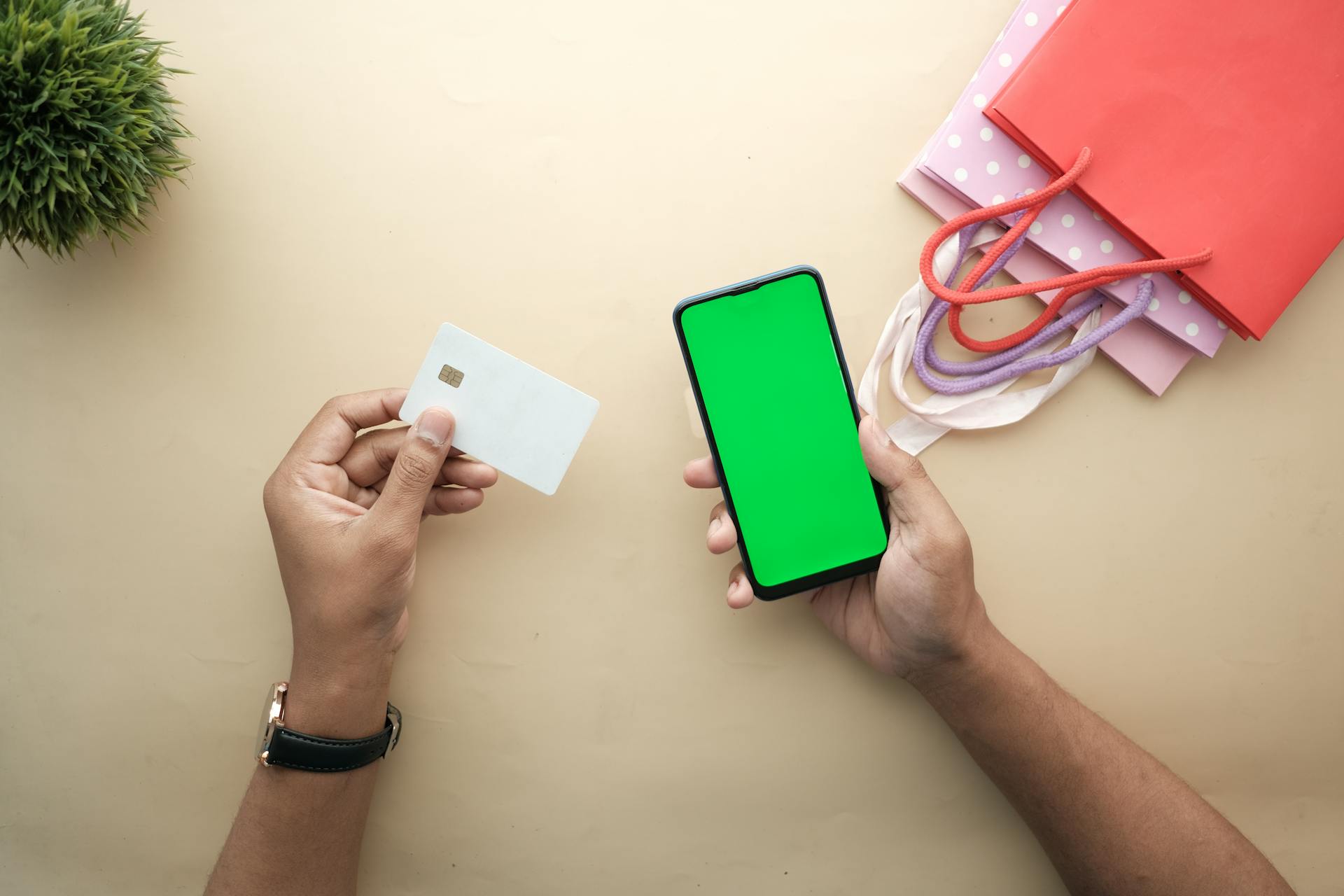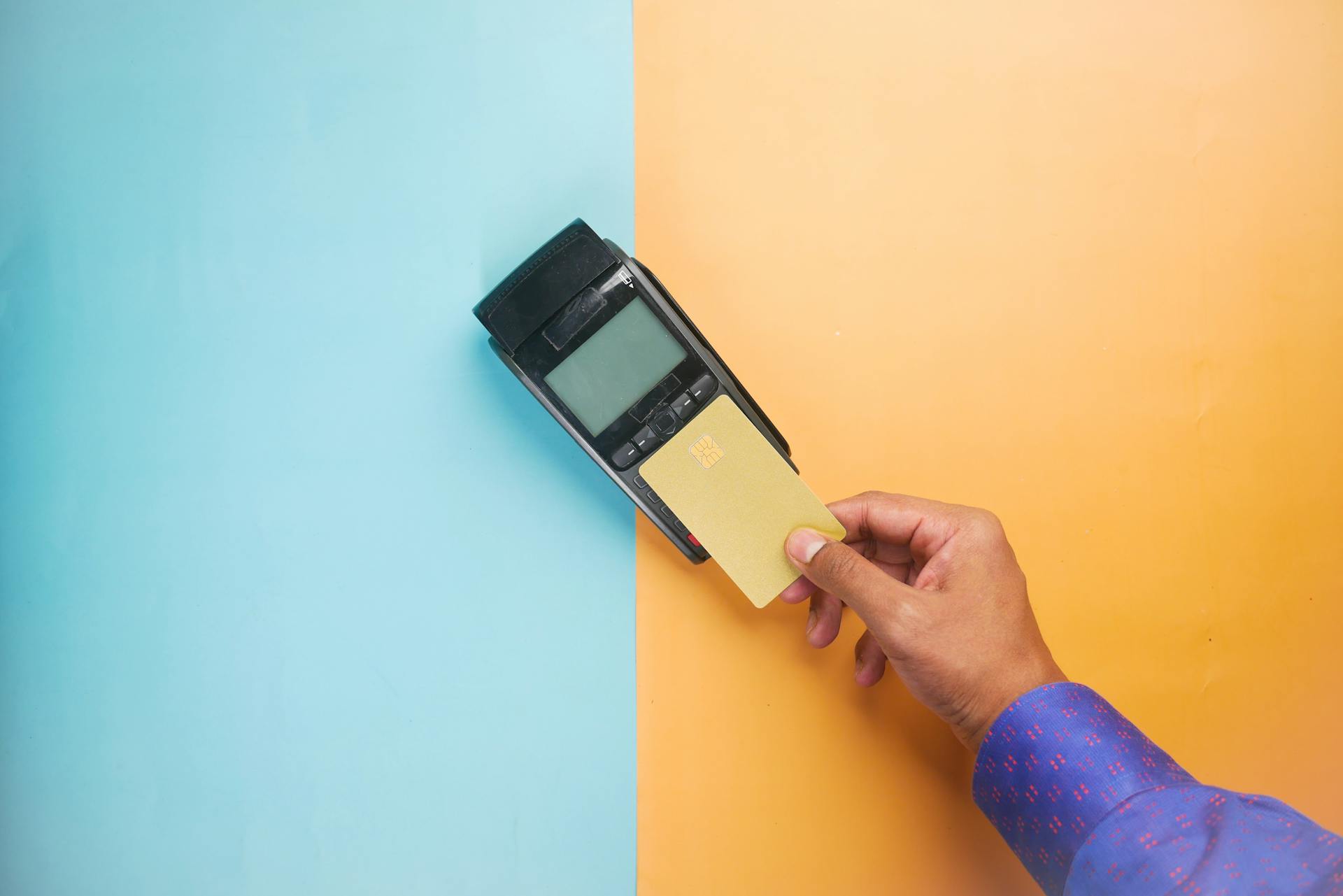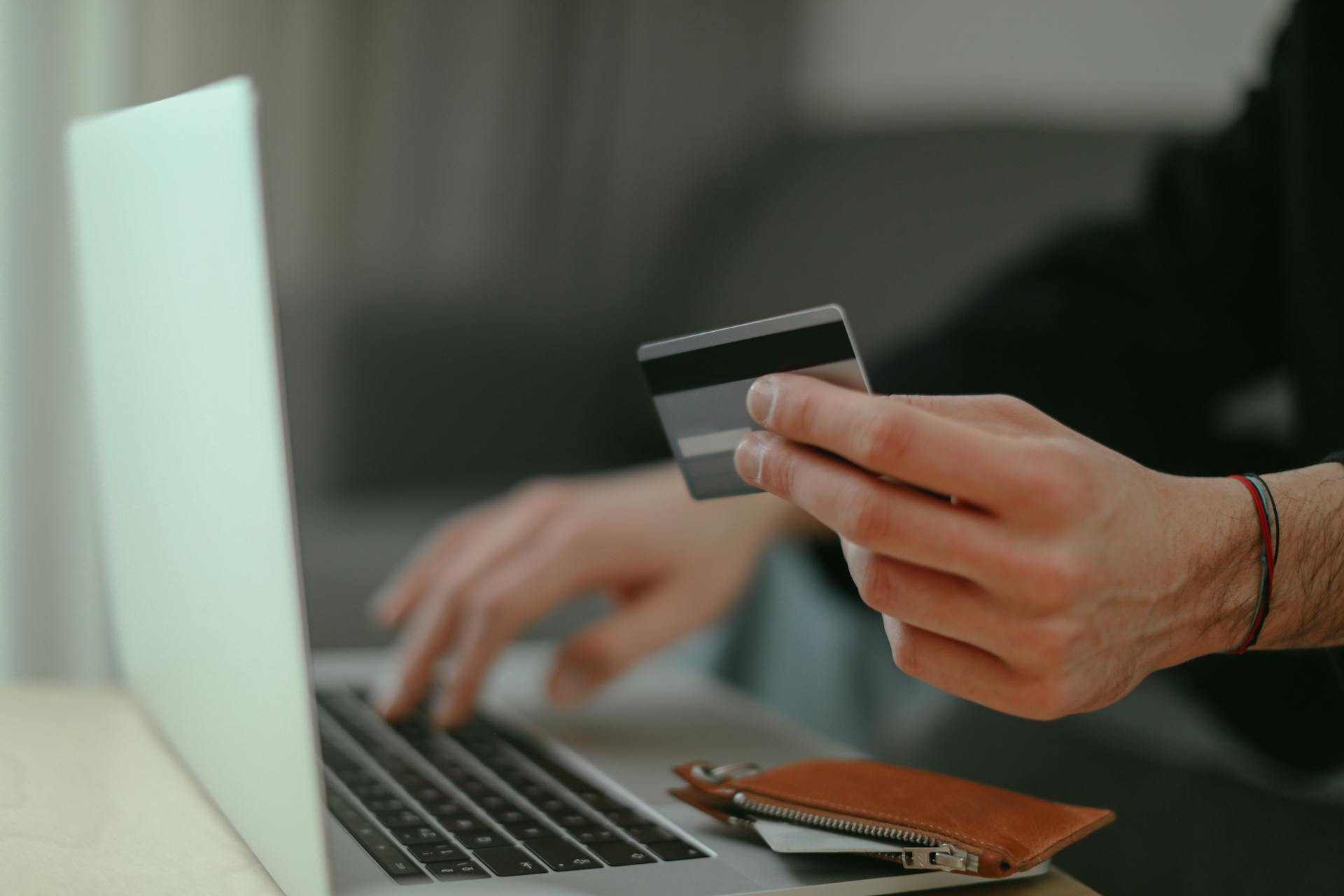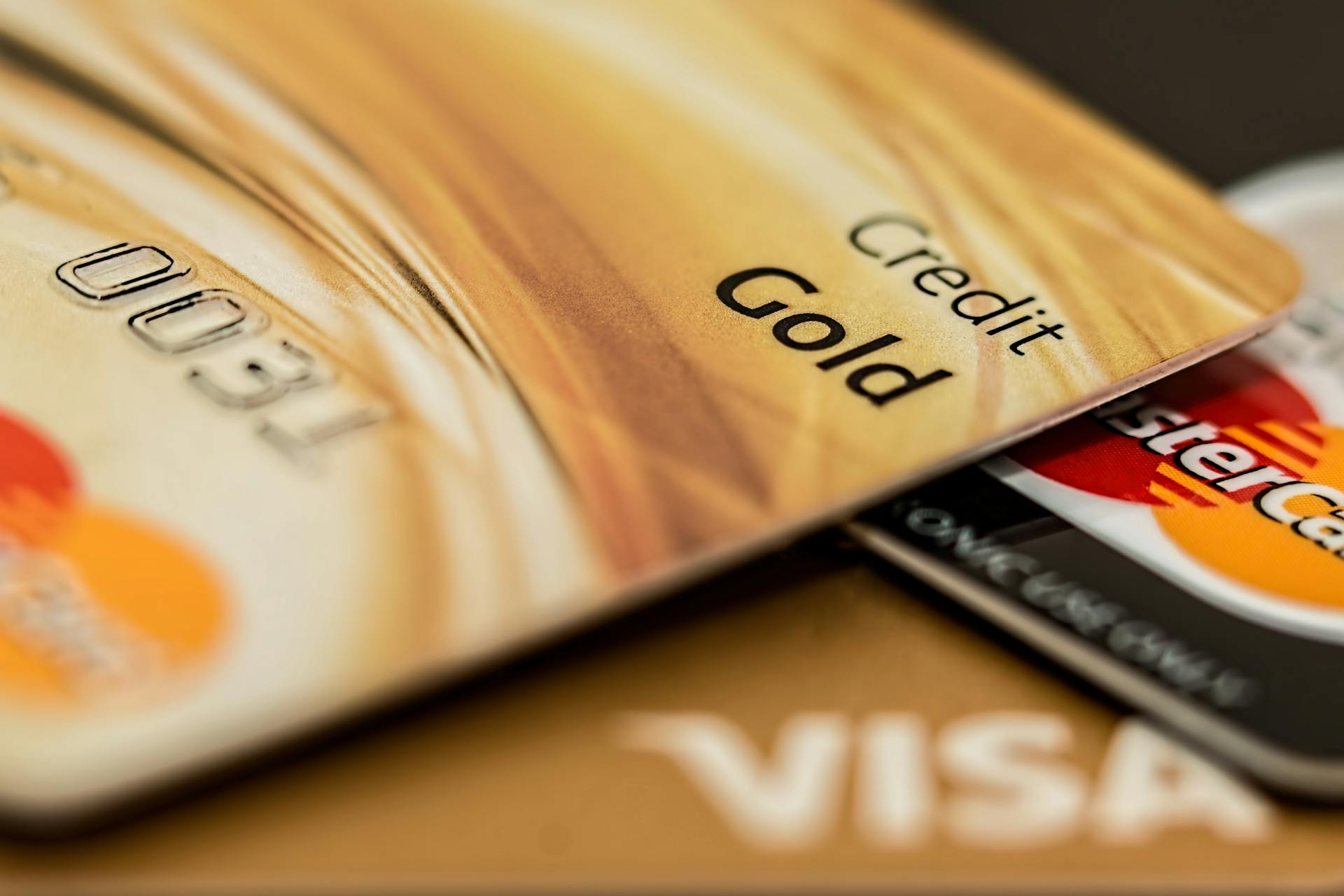
Using credit cards responsibly can actually help your financial situation.
By paying off your balance in full each month, you can earn rewards and cash back on your purchases, which can add up quickly. For example, if you spend $1,000 per month on your credit card and earn 1% cash back, that's $10 per month in rewards.
Paying off your balance on time also helps you build credit. A good credit score can open doors to better loan rates, lower interest rates, and even higher credit limits. In fact, according to a study, people with excellent credit scores can save thousands of dollars in interest over the course of a year.
Discover more: Can You Negotiate Lower Interest Rates on Credit Cards
Getting Started
To build credit with a credit card, you'll need to open a credit card of your own or become an authorized user on someone else's credit card. This can be a great option if you're starting to build or rebuild your credit.
Expand your knowledge: Do Amazon Credit Cards Build Credit
Secured credit cards are often a good first option, as they function like normal credit cards but require a refundable security deposit. They may have high fees, but responsible use can help you qualify for better credit cards later.
A student credit card can also be a good choice if you're a student, with low credit limits but few fees and rewards on purchases.
Benefits and Features
Credit cards can offer a range of benefits and features that make them a valuable tool for managing your finances.
Many credit cards come with additional benefits and protections that can provide significant value, such as purchase protection, extended warranties, and travel insurance. These perks often come at no extra cost to the cardholder.
Some popular features of credit cards include:
- Purchase Protection: Coverage for damaged or stolen items purchased with your credit card.
- Extended Warranties: Additional warranty coverage on eligible purchases.
- Travel Insurance: Coverage for trip cancellations, interruptions, and lost luggage.
- Price Protection: Reimbursement if you find a lower price on an eligible item within a specified time frame.
Additionally, credit cards can offer rewards programs that provide cash back, points, or miles for every dollar spent, making them a convenient and secure way to make purchases.
Convenience
Credit cards offer a range of convenience features that make them a popular choice for making purchases.
You can use your credit card globally, making it a convenient payment method for travel and online shopping. The major networks, including Visa and MasterCard, have a wide acceptance rate, so you can use your credit card almost anywhere.
Fraud alerts are another convenient feature of credit cards. You'll receive real-time alerts for suspicious activity on your account, so you can take action quickly if something doesn't seem right.
Some credit cards also offer zero-liability protection, which means you won't be held responsible for unauthorized transactions. This can give you peace of mind when making online purchases or using your credit card in unfamiliar areas.
Here are some of the convenience features you can expect from your credit card:
- Fraud Alerts: Receive real-time alerts for suspicious activity on your account.
- Zero-Liability Protection: Protection against fraudulent charges, ensuring you are not held responsible for unauthorized transactions.
- Global Acceptance: Use your credit card anywhere Visa, MasterCard, or other major networks are accepted.
Rewards and Cash Back
You can earn rewards and cash back with a credit card, but first, you should consider what your top spending categories are, then pick a card that will provide the best returns for you.

There are two main types of rewards: cash back credit cards and travel credit cards. Cash back credit cards give you cash back rewards on your purchases in the form of statement credits, direct deposits, or gift cards.
Some popular reward categories include travel, cash back, and specific categories like groceries, dining, or gas. Travel credit cards give you rewards in the form of points or miles that you can redeem for flights, hotel stays, and more.
The Chase Sapphire Preferred Card offers 5x on travel purchased through Chase Travel℠, while the Citi Double Cash Card earns 2% on every purchase with unlimited 1% cash back when you buy, plus an additional 1% as you pay for those purchases.
To maximize the benefits of your card, find one that matches your spending habits. The Chase Freedom Flex℠ Card offers 5% cash back on up to $1,500 in combined purchases in bonus categories each quarter you activate.
Some cards have restrictions on how you can redeem the rewards, so consider how much time and effort you want to put in and whether you'd prefer a simple card with straightforward rewards.
Related reading: Can You Link Credit Cards to Cash App
Responsible Use

Using a credit card responsibly is key to building good credit. A credit card can be a helpful tool for achieving long-term personal finance goals.
With responsible use, a credit card can be a helpful tool for building credit. Good credit scores can help you achieve your long-term personal finance goals. Keeping these tips in mind can make all the difference.
Here are 10 tips for using a credit card responsibly: pay your balance in full each month, make timely payments, keep your credit utilization ratio low, avoid unnecessary fees, and monitor your credit report regularly.
On a similar theme: How Do I Change My Address with the Credit Bureaus
Financial Flexibility
Having a credit card available for emergencies can provide financial flexibility when unexpected expenses arise.
Paying off your balance on time is key to keeping your credit limit available for use when you need it most.
Unexpected medical bills or prescriptions can be a huge financial burden, but having a credit card can help cover these expenses.
Discover more: Vive Financial Credit Card
Car repairs are another example of an unexpected expense that can be covered with a credit card, especially if they can't be postponed.
Home repairs, like plumbing or electrical problems, can also be addressed with a credit card if you don't have the cash on hand.
Here are some examples of unexpected expenses that a credit card can help cover:
- Medical Emergencies: Covering unexpected medical bills or prescriptions.
- Car Repairs: Paying for urgent vehicle repairs that can't be postponed.
- Home Repairs: Addressing immediate home maintenance issues like plumbing or electrical problems.
Understanding Credit
Your credit score is a three-digit number that reflects your creditworthiness, and it's calculated based on five key components. These components are payment history, credit utilization, length of credit history, new credit, and credit mix, which each make up a percentage of your total score.
A payment history that's 35% of your total score is determined by how often you pay on time, which tells lenders how reliable you are as a borrower. This is the biggest factor in your credit score, so making timely payments is crucial.
Credit utilization, which accounts for 30% of your score, is the ratio of the amount you borrow to the amount that's available to you. Keeping your credit card balances low relative to your credit limit improves your credit utilization ratio.
You might enjoy: Chase Bank Credit Card Bill Pay
Your length of credit history, which is 15% of your score, is how long you've used credit. The longer you've been using credit, the better, as this shows lenders that you're able to manage your credit responsibly.
New credit, which is 10% of your score, is how often you apply for credit products or loans, and what percentage of your credit comes from recently opened accounts. This can have a negative impact on your score if you're applying for too much credit too quickly.
Your credit mix, which is also 10% of your score, is how many different types of credit you use. Having a mix of different credit types, such as credit cards, loans, and a mortgage, can help improve your credit score.
Here's a breakdown of the five components of your credit score:
By understanding how your credit score is calculated and what factors affect it, you can take steps to improve your credit score over time.
Paying Bills

Paying your bill on time is the single most important step to build your credit. 35% of your FICO score is determined by your payment history.
Making at least the minimum payment on time every month will help you avoid interest charges, late fees, and poor credit scores. The minimum payment is the amount you'll need to pay before the payment date in order to avoid consequences like late fees and a dip in your credit score.
The closing date is the last day you can make a charge for that particular statement. After the closing date, any new transaction will go onto next month's statement.
To avoid late fees and interest charges, pay your entire statement balance every month before the payment date. The payment date or due date tells you when the payment for a particular statement is due.
Setting reminders or enrolling in autopay can help ensure you meet deadlines every month. This way, you'll never miss a payment.
Related reading: Payment of Creditors on Account
Here's a breakdown of key terms to help you understand your credit card statement:
- Closing date: the last day you can make a charge for that particular statement
- Payment date or due date: when the payment for a particular statement is due
- Minimum payment: the amount you'll need to pay before the payment date
- Statement balance: how much you owe in total as of the closing date
- Grace period: the time between the closing date and the payment date
- Credit limit: the total amount you can charge to your card at one time
Managing Credit
Managing your credit effectively is key to reaping the benefits of using credit cards responsibly. By making on-time payments and keeping your balance low, you can build a strong credit history and improve your credit score.
To track and manage your expenses, use the detailed statements provided by your credit card issuer to categorize your spending and identify areas where you can cut back. This will help you stay within your budget and plan for future expenses.
A good credit utilization ratio is below 30% of your credit limit, so try to keep your balance below this threshold. This will help you avoid financial strain and maintain a healthy credit score.
If your credit issuer offers a credit limit increase, consider accepting it, as this can help lower your credit utilization ratio and improve your credit score. However, be cautious not to overspend and keep your balances low.
Suggestion: Bank of America Credit Card Balance Transfer
To keep your oldest accounts open, consider downgrading to a no-fee version or setting up a small monthly payment to keep them active. This will help lengthen your credit history and contribute positively to your credit mix.
Here are some key tips to keep in mind:
- Make on-time payments to build a strong credit history.
- Keep your balance below 30% of your credit limit to maintain a healthy credit utilization ratio.
- Consider accepting a credit limit increase to lower your credit utilization ratio.
- Keep your oldest accounts open to lengthen your credit history.
Frequently Asked Questions
Does paying off a credit card help your credit?
Paying off a credit card can significantly improve your credit score, especially if you were carrying a high balance. This can also free up your entire credit limit for future purchases, helping you manage expenses more effectively.
What happens when you pay your credit card bills on time every time?
Paying your credit card bills on time every time helps you avoid interest charges and debt, but it's just the first step in responsible credit card management. To truly benefit, consider paying your balance in full each month to stay debt-free.
Sources
- https://www.lendingtree.com/credit-cards/articles/how-use-credit-cards/
- https://www.experian.com/blogs/ask-experian/how-to-use-a-credit-card-to-build-credit/
- https://www.capitalone.com/learn-grow/money-management/tips-using-credit-responsibly/
- https://www.hotbot.com/answers/credit-cards-can-help-_____________-when-paid-off-on-time-regularly.
- https://nuvisionfederal.com/blog/memberresources/2024/11/12/using-credit-wisely
Featured Images: pexels.com


